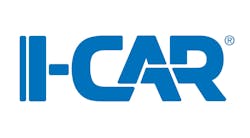I-CAR offering online courses on EVs
Take the next step in your “electrification” collision repair plans with these I-CAR courses available now to lead your team forward. All online courses are designed for maximum learning, each accomplished in just 60 minutes or less.
Introduction to Electric Vehicles
This 30-minute course introduces students to the different types of EVs on the road today. It identifies the unique parts of an EV, and the purpose of those parts. Students are also introduced to the EV specific warning indicators that are displayed on the instrument panel with a description of their meaning. Video is also included to highlight the steps for operating an EV for the first time.
Understanding high voltage safety
This 45-minute course explains the elements of electricity and the relationship between voltage, current and resistance with high voltage systems. This course also describes the effects of electricity on the body and lists the required PPE when working around high voltage. The major parts of an electric vehicle high voltage (HV) system, HV safety measures in a vehicle design, and the methods to reduce shock risks are also introduced and described within the course modules.
Hybrid vehicle identification and damage analysis
This one-hour course explains the different types and parts of hybrid and electric vehicles. Hybrid vehicle identification and important safety procedures when inspecting electrified vehicles are also covered in this course, including steps to disable a hybrid system and an overview of the cooling systems for a high-voltage battery.
Hybrid, electric, and alternative fuel vehicle service
This 45-minute course teaches students the safety precautions when working with compressed natural gas (CNG) and liquid propane gas (LPG) vehicles. Safety parameters including personnel safety, vehicle system and part safety as well as shop safety are also covered. Several procedural examples are given for alternative fuel vehicles including inspection and part replacement.
Electric Vehicle (EV) initial inspection and handling
When an EV initially arrives at a collision repair facility, there are specific inspection and handling considerations you should be aware of. This course takes a look at HV lithium-ion battery and other safety topics relevant to storing the vehicle that should be evaluated before damage analysis begins.
Electric Vehicle (EV) damage analysis
This course provides a great level of detail on an EVs high voltage components, safety precautions and relevant non-high voltage parts. It also provides damage inspection and estimating considerations for EVs.
Introduction to Electric Vehicle (EV) service considerations
This course covers EV service topics to help provide the learner with an understanding of some of the unique aspects and requirements when performing service operations like HV shut down, battery removal, EV drive motor assembly removal and other operations associated with EVs.
